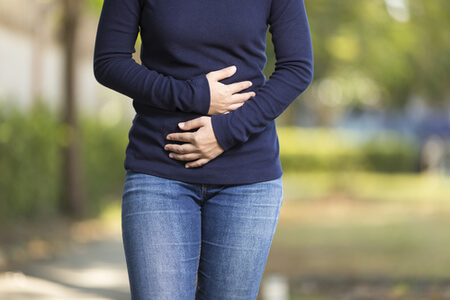I just wrote a blog about mindful eating. But what many women are really mindful about is finding the closest bathroom after they eat. For most of them, their digestive problems have persisted for years.

These painful (and embarrassing) digestive symptoms don’t just ruin your dinner plans – they can threaten your health. But digestive enzymes can remedy the problem even when other approaches have failed.
5 digestive enzymes you need to end bloating and gas
From your breakfast to your midnight snack, your daily diet probably has a lot of variety. And each macronutrient in your favorite foods needs a different digestive enzyme to break it down into smaller, more digestible nutrient molecules.
When food breakdown fails or is incomplete, you quickly end up with dreaded digestive symptoms, and they can be life-altering. You’re also at greater risk for developing nutrient deficiencies that may lead to increased risk of chronic disease and impaired general health. These are 5 digestive enzymes that can help you decrease bloating, gas and constipation:
- Amylase: helps digest carbohydrates
- Protease: helps digest proteins
- Lipase: helps digest fats
- Cellulase: helps digest fiber
- Dipeptidyl peptidase IV (DPP-IV): helps digest gluten
We’re creating the perfect digestive storm
The standard American diet (SAD) is one of the biggest reasons we don’t have the digestive enzymes we need. Our ancestors consumed more plant-based foods which are enzyme-rich. In today’s society people are consuming lots of meat, which has much fewer enzymes, making it more difficult to digest. Over time, your digestive system becomes weaker when it continuously has to break down enzyme-deplete foods.
Two more factors add to this perfect storm:
1. Women are much more likely to have digestive issues than men.
2. Common women’s hormonal disturbances like menopause or thyroid and adrenal issues cause their own digestive disruptions.

So many missed opportunities for better digestion
Most of us dramatically underestimate the harmful effects of the way we eat, not just what we eat. Digestion is a complicated multi-phase process. If something goes wrong in any of the following steps, your body will let you know.
- As soon as you eat, salivary amylase in your mouth kicks off the digestive process by breaking down bigger starch molecules (polysaccharides) into smaller ones, called maltose and dextrin. If you’re wolfing down your lunch while surfing online – perhaps even right now – you’re probably not chewing each bite the 20 to 30 times needed to start breaking down food.
- As food moves to your stomach, gastric juices take over. Hydrochloric acid in the stomach dissolves food, kills unwanted microorganisms and converts pepsinogen into pepsin, a protein-breaking enzyme. Pepsin works with the acidic environment of the stomach to break protein into smaller subcomponents. If you’re lacking the right amount of stomach acid due to your diet, digestion issues can really gain a foothold here.
- From your stomach, partially broken down food moves into the upper section of the small intestine. At this stage, only a few of the proteins and carbohydrates have been broken down, and none of the fats. The pancreatic enzymes trypsin and chymotrypsin digest additional members of the protein family. These function best in the more alkaline (or basic) environment of the intestine. Other pancreatic enzymes include pancreatic amylase, which continues breaking down starches into maltose; and lipase, which begins to digest fats into glycerol and fatty acids. If you’re suffering from inflammation – often due to hormonal imbalance – it’s more difficult for your body to produce the needed enzymes.
- The large intestine does a major part of digestion, such as absorbing water and sodium, as well as the ongoing manufacturing and absorption of micronutrients, all with the help of your intestinal flora. What’s left after this step leaves your body as waste. If you don’t have enough enzymes here, the food you ate will exit your system without any of its nutrients being absorbed.
The best ways to reduce your symptoms
To clear up your symptoms, your first move should be to work with your healthcare practitioner to figure out which digestive enzymes are most needed to assist your system. Some options include:
Betaine HCl is useful for treating patients with digestive issues such as acid reflux (GERD) – particularly those with hypochlorhydria, where not enough acid is produced by the stomach. Betaine HCl is occasionally prescribed for patients with other forms of indigestion such as heartburn and gas, but also for rosacea, asthma, yeast, allergies and sensitivities.
Multi-enzyme products contain a spectrum of enzymatic ingredients, some of which support the action in the stomach and others that boost the enzymatic action taking place further down the digestive tract. These products can contain many enzymes, including:
|
|
You can discuss recommended brands for betaine HCl and digestive enzymes with your functional medicine practitioner. Different brands contain varying amounts of each enzyme and knowing your health history will guide the process.
Eliminate dairy products. Dairy products are among the most common food sensitivities that can cause bloating, gas and constipation. If you are unsure whether or not you digest dairy well, I recommend my patients eliminate dairy products for a minimum of four weeks to see if their symptoms improve.
Along with dietary changes and enzymes, I often recommend a probiotic for my patients who are experiencing digestive issues. Using a high quality, research-based probiotic will provide your microbiome with enough of the good bugs your GI tract needs to stay balanced and healthy.
Once your digestive system is getting a little help, you’ll be on your way to enjoying mealtime again! So, what’s for dinner?
 |
Check out effective ways to calm your digestive system and feel good after eating: How to balance your gut flora to reduce your symptoms. |










